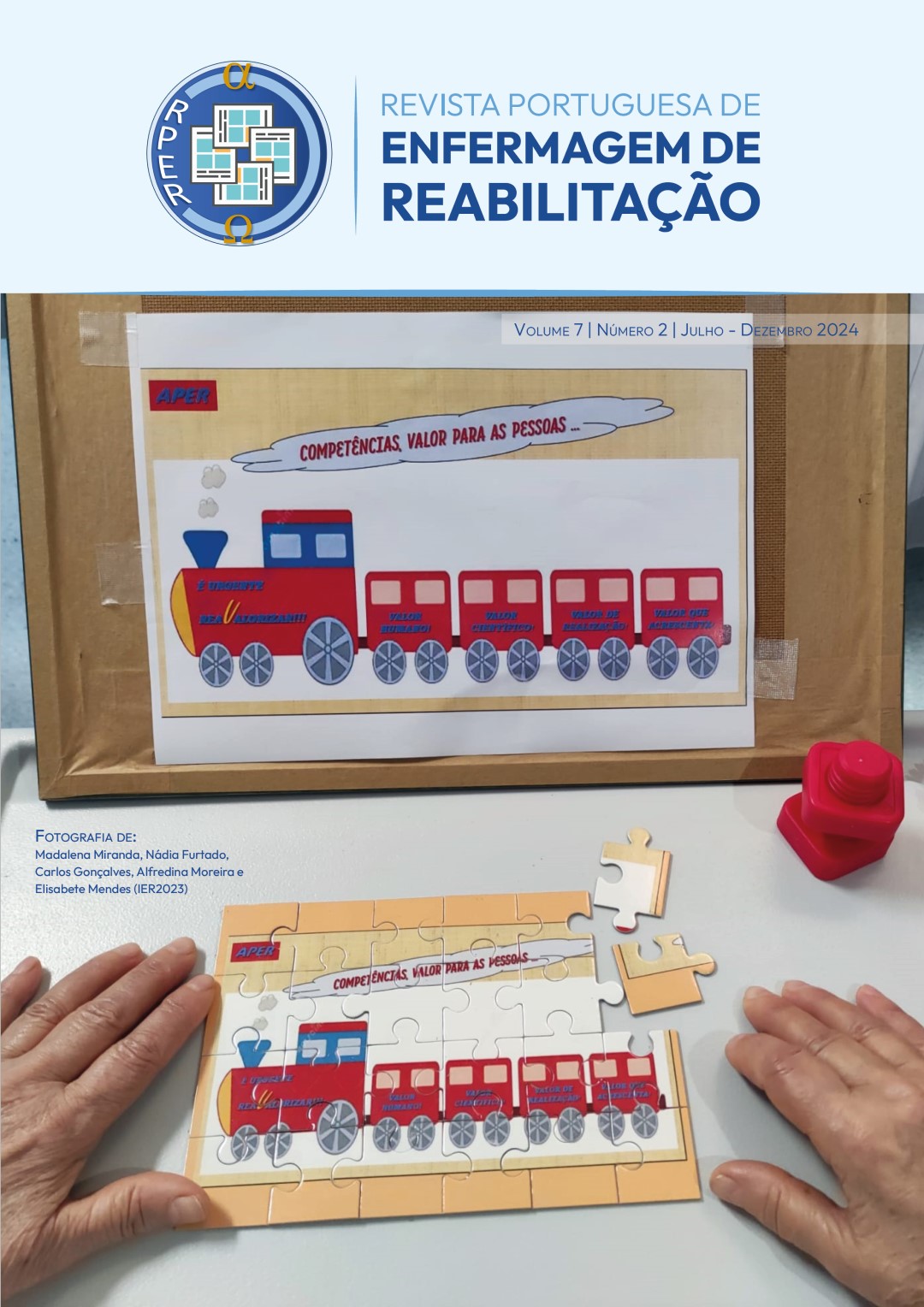Perceived barriers and criteria for referral to pulmonary rehabilitation used in primary health care by general practitioners
DOI:
https://doi.org/10.33194/rper.2024.36144Keywords:
Pulmonary rehabilitation, Pulmonary Disease, Chronic Obstructive, Physicians, Family, Referral and Consultation, RehabilitationAbstract
Introduction: Chronic obstructive pulmonary disease encompasses both pharmacological and non-pharmacological components. The most cost-effective non-pharmacological component is pulmonary rehabilitation, an individualised, comprehensive intervention, including exercise training, education, and behavior change, to improve the physical and psychological condition and promote adherence to long-term healthy behaviors.
The aim was to understand the habits and barriers perceived by Portuguese general practitioners when referring people with chronic obstructive pulmonary disease to pulmonary rehabilitation and the criteria valued in decision-making.
Methodology: We conducted a cross-sectional study to assess general practitioners' knowledge, referral practices, and perceived barriers regarding pulmonary rehabilitation using an online questionnaire. The questionnaire evaluated knowledge of PR benefits, referral criteria, and existing barriers.
Results: Sixty-one responses were obtained, of which 31.1% (n=19) never referred to PR. Of those who were referred, the most used criterion for referral, 78.5% (n=33), was functional limitation. This criterion was considered extremely important for referral by 64% (n=39) of the participants in this study.
Discussion: To increase referrals to pulmonary rehabilitation, doctors must raise awareness of the advantages of these programmes. Publicising existing programmes is essential to ensure that general practitioners know these responses. Information from the assessment of the impact of pulmonary rehabilitation programmes on a person's condition should be shared.
Conclusion: Insufficient available PR programmes, Lack of patient adherence and feedback of programme outcomes and lack of knowledge of referencing criteria are the most perceived barriers by general practitioners to referring patients to pulmonary rehabilitation programmes.
Downloads
References
Global Initiative for Chronic Obstructive Lung Disease. GOLD guidelines for the diagnosis, management, and prevention of chronic obstructive pulmonary disease (COPD). 2024 report. [Internet]. goldcopd.org. 2023 [cited 2024 May 27].
Rochester CL, Holland AE, Alison JA, Carlin B, Bauldoff G, Bhatt SP, et al. Pulmonary Rehabilitation for Adults with Chronic Respiratory Disease An Official American Thoracic Society Clinical Practice Guideline. Am J Respir Crit Care Med. 2023;208(4):E7–26.
Fundação Portuguesa do Pulmão. Observatório Nacional Doenças Respiratórias 2022. 2022:1-128.
Santos AC, Barreto C, Barata F, Froes F, Carvalho I, Pité I, et al. 13o Relatório Do Observatório Nacional Das Doenças Respiratórias. Obs Nac das doenças Respir. 2018;45.
Wadell K, Ferreira TJ, Arne M, Lisspers K, Stallberg B, Emtner M. Hospital-Based Pulmonary Rehabilitation in Patients with COPD in Sweden-A National Survey. Respir Med. 2013;107(8):1195-1200. doi: 10.1016/j.rmed.2013.04.019
Machaqueiro S, Escoval AA. A Reabilitação Respiratória Para Doentes Com Doença Pulmonar Obstrutiva Crónica. 2012.
Cox NS, Oliveira CC, Lahham A, Holland AE. Pulmonary rehabilitation referral and participation are commonly influenced by environment, knowledge, and beliefs about consequences: a systematic review using the Theoretical Domains Framework. J Physiother. 2017;63:84–93.
Polo J, Madera D, Boye-Codjoe E, et al. Barriers to COPD-patients’ starting pulmonary rehabilitation: a comparison between telehealth and standard pulmonary rehabilitation referrals. Am J Respir Crit Care Med. 2019;199: A5731
Swift E, O’Brian MR, Peters S, Kelly C. Healthcare Professionals’ Perceptions of Pulmonary Rehabilitation as a Management Strategy for Patients with Chronic Obstructive Pulmonary Disease: A Critical Interpretive Synthesis. Disabil Rehabil. 2022;44(5):520-35. doi: 10.1080/09638288.2020.1789324
Holland AE, Cox NS, Houchen-Wolloff L, Rochester CL, Garvey C, Zuwallack R, et al. AMERICAN THORACIC SOCIETY Defining Modern Pulmonary Rehabilitation. Ann Am Thorac Soc. 2021;18(5):742-52. doi: 10.1513/AnnalsATS.202102-146ST
Mendes Xavier D, Lanza Galvão E, Aliane Fonseca A, de Souza GM, Pereira Lima V. Effects of Home-Based Pulmonary Rehabilitation on Dyspnea, Exercise Capacity, Quality of Life and Impact of the Disease in COPD Patients: A Systematic Review. COPD J Chronic Obstr Pulm Dis. 2021;19(1):18-46. doi: 10.1080/15412555.2021.2020234
Holland AE, Mahal A, Hill CJ, Lee AL, Burge AT, Cox NS, et al. Low Cost Home-Based Pulmonary Rehabilitation For Chronic Obstructive Pulmonary Disease: A Randomized Controlled Equivalence Trial. RESPIRATORY. 2016;193(2, SI):60.
Holland AE, Mahal A, Hill CJ, Lee AL, Burge AT, Cox NS, et al. Home-Based Rehabilitation for COPD Using Minimal Resources: A Randomised, Controlled Equivalence Trial. Thorax. 2017;72(1):57-65. doi: 10.1136/thoraxjnl-2016-208514
DGS. Programas de Reabilitação Respiratória Nos Cuidados de Saúde Primários OT 014/2019. 2019.
Jones PW, Hogg LC, Nolan J, Jefford M, Grant A, Lord VM, et al. The COPD Assessment Test (CAT): Response to Pulmonary Rehabilitation. A Multicentre, Prospective Study. Thorax. 2011;66(5):425-9. doi: 10.1136/thx.2010.156372
da Rocha Camargo LAC, de Castro Pereira CA. Dispneia em DPOC: além da escala modified Medical Research Council. J Bras Pneumol. 2010;36(5):571-8.
Watson JS, Jordan RE, Gardiner L, Adab P, Jolly K. A systematic review of the effectiveness of interventions to promote referral; adherence; and uptake of pulmonary rehabilitation for patients with chronic obstructive pulmonary disease. Int J Chron Obstruct Pulmon Dis. 2023;18(July):1637-54. [doi: 10.2147/COPD.S396317]
Downloads
Published
How to Cite
Issue
Section
License
Copyright (c) 2024 Portuguese Rehabilitation Nursing Journal

This work is licensed under a Creative Commons Attribution-NonCommercial-NoDerivatives 4.0 International License.




















